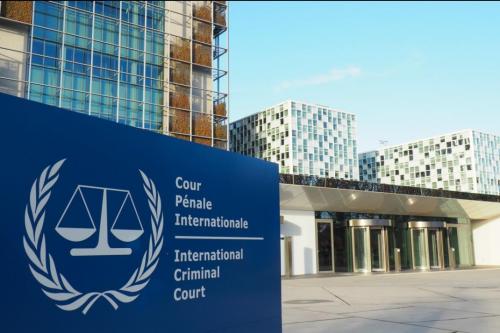US Threatens International Criminal Court
Visa Bans on ICC Staff
The United States decision to impose visa bans on International Criminal Court (ICC) staff will imperil accountability for grave international crimes, Human Rights Watch said on Jan 15, 2019. US Secretary of State Michael Pompeo on March 15, 2019 announced that the bans will apply to ICC personnel involved in the court’s potential investigation of US citizens and may possibly be used to deter ICC investigations against citizens of US allies.

Permanent premises of the International Criminal Court in The Hague, the Netherlands.
The US action appears to have been spurred by a possible ICC investigation in Afghanistan that could examine conduct by US personnel and by a possible investigation in Palestine that would likely include conduct by Israeli officials. ICC judges will determine whether an Afghanistan investigation will be opened. The ICC prosecutor will decide whether to proceed with a Palestine investigation.
“The US decision to put visa bans on ICC staff is an outrageous effort to bully the court and deter scrutiny of US conduct," said Richard Dicker, international justice director at Human Rights Watch. “ICC member countries should publicly make clear that they will remain undaunted in their support for the ICC and will not tolerate US obstruction.”
The ICC is the permanent international court in The Hague with a mandate to try those responsible for genocide, war crimes, crimes against humanity, and the crime of aggression. The international community created the ICC to fight impunity for these crimes, following the horrors of genocide in the mid-1990s in Rwanda and in the former Yugoslavia. The ICC is a court of last resort and will only open investigations if national authorities are unwilling or unable to conduct genuine national proceedings in these cases.
ICC judges have yet to rule on the ICC prosecutor’s November 2017 request to investigate certain crimes committed in the context of the armed conflict in Afghanistan since May 2003. In addition to grave crimes by the Taliban and Afghan government forces, the court could also investigate alleged crimes by foreign forces – notably those by the US military and Central Intelligence Agency (CIA) – most of which are alleged to have been committed between 2003 and 2004. Pompeo also announced that the same policy may be used to deter ICC investigations of allied personnel, including Israelis. The ICC prosecutor is examining alleged crimes by Israelis and Palestinians in Gaza and the West Bank. Palestine is an ICC member country.
Pompeo made clear that the US would take further action if the ICC moves forward with investigations of US nationals. In a September 2018 speech, the US national security adviser, John Bolton, announced a change in US policy toward the court and outlined several steps the US would take if ICC investigations reached US nationals or the nationals of US allies. In addition to travel bans, Bolton threatened prosecutions and financial sanctions against ICC staff, as well as against countries and companies assisting in ICC investigations of US nationals. He warned that the US would restart long-abandoned efforts to negotiate agreements with other countries against surrendering US nationals to the court and put other governments’ diplomatic, military, and intelligence ties with the US at risk if those governments cooperate with the ICC in investigations of the US or its allies.
“The ICC, despite its shortcomings, remains one of the few available tools to bring justice if national courts fail to do so,” Dicker said. “At a time of rampant atrocities in South Sudan, Myanmar and Syria, the US is sending exactly the wrong message in targeting ICC staff simply for doing their job – bringing justice for victims of international crimes.”
Bolton was the architect of a hostile campaign against the ICC in the early 2000s under the George W. Bush administration. However, these efforts did little more than erode US credibility on international justice and were abandoned. Members of the US Congress who recognize the ICC as crucial for international justice should call for rescinding this policy immediately.
ICC member countries announced in December that they were “undeterred by any threats against the court, its officials, and those cooperating with it,” and would “stand united against impunity.” In addition to speaking out publicly, member countries will need to work together to resist US obstruction, Human Rights Watch said.
The US, which is not a party to the court’s Rome Statute, objects to the ICC’s jurisdiction over nationals of non-member countries, absent a referral to the court by the United Nations Security Council. Afghanistan, however, is an ICC member country, giving the ICC authority to investigate and prosecute crimes committed by their nationals or by anyone on Afghan territory.
The court’s authority is nothing unusual. US and other citizens who commit crimes abroad are already subject to the jurisdiction of foreign courts. Countries that ratify the Rome Statute are simply delegating their authority to prosecute certain grave crimes committed on their territory to an international court.
Since beginning operations in 2003, the ICC has opened investigations in 10 countries, including Darfur in Sudan, Democratic Republic of Congo, Mali, and Georgia. In addition to Palestine, its prosecutor is considering whether investigations are warranted in another nine situations, including in the Philippines, in Ukraine, and the alleged deportation of the Rohingya people from Myanmar to Bangladesh.
“Trump administration threats against the ICC mask the real problem, the failure of US authorities to address past torture and other abuses by the CIA and US armed forces,” Dicker said. “This is precisely the ICC’s role, to deliver justice for victims when all other doors are closed.”
Source:Human Rights Watch
- 341 reads
Human Rights
Ringing FOWPAL’s Peace Bell for the World:Nobel Peace Prize Laureates’ Visions and Actions

Protecting the World’s Cultural Diversity for a Sustainable Future

The Peace Bell Resonates at the 27th Eurasian Economic Summit

Declaration of World Day of the Power of Hope Endorsed by People in 158 Nations

Puppet Show I International Friendship Day 2020

